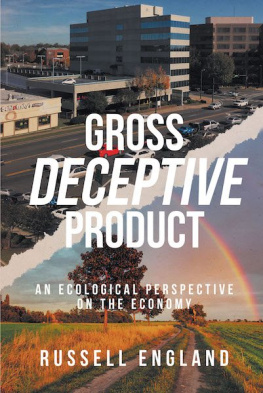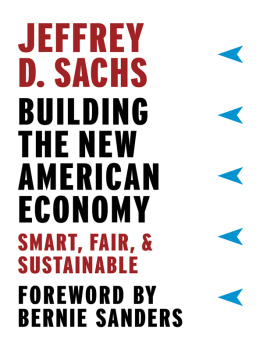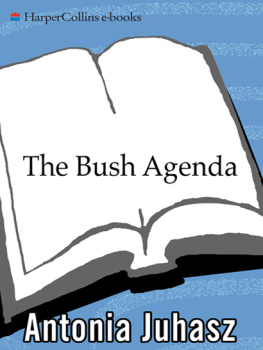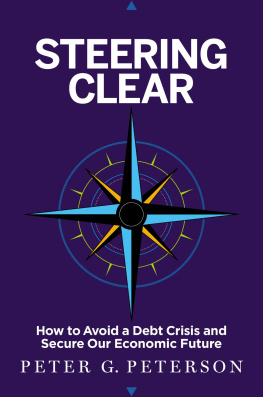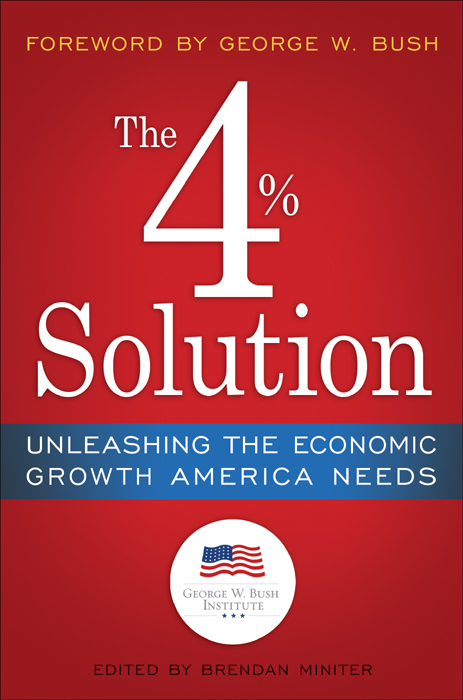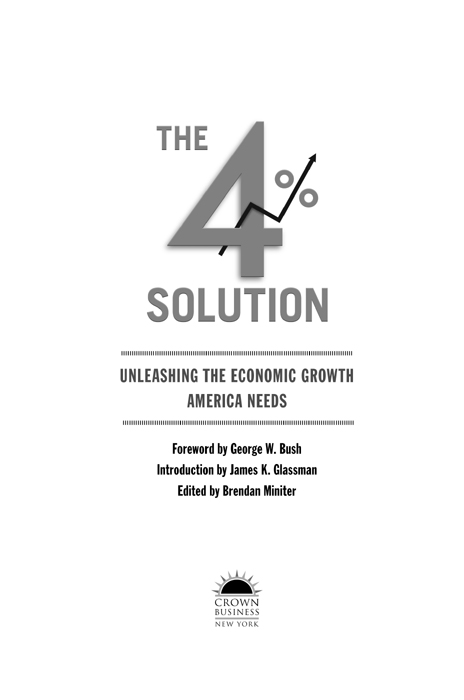
Copyright 2012 by the George W. Bush Foundation
All rights reserved.
Published in the United States by Crown Business, an imprint of the
Crown Publishing Group, a division of Random House, Inc., New York.
www.crownpublishing.com
CROWN BUSINESS is a trademark and CROWN and the Rising Sun colophon are registered trademarks of Random House, Inc.
Crown Business books are available at special discounts for bulk purchases for sales promotions or corporate use. Special editions, including personalized covers, excerpts of existing books, or books with corporate logos, can be created in large quantities for special needs. For more information, contact Premium Sales at (212) 572-2232 or e-mail .
Library of Congress Cataloging-in-Publication Data is available upon request.
eISBN: 978-0-307-98615-3
v3.1
Contents
Foreword
George W. Bush
Introduction: We Can Do It
James K. Glassman
Chapter 1 Why We Grow
Brendan Miniter
Chapter 2 Incentives
W. Michael Cox and Richard Alm
Chapter 3 The History and Future of Economic Growth
Robert E. Lucas Jr.
Chapter 4 More Time on the Job
Edward C. Prescott
Chapter 5 At Home in the Great Recession
Steven Gjerstad and Vernon L. Smith
Chapter 6 Spending, Taxes, and Certainty: A Road Map to 4%
Kevin Hassett
Chapter 7 Sound Money, Sound Policy
David Malpass
Chapter 8 Not All Growth Is Good
Myron Scholes
Chapter 9 Entrepreneurs and Creative Destruction
Peter G. Klein
Chapter 10 Baseballs Answer to Growth
Robert Litan
Chapter 11 The Role of Intangibles
Nick Schulz
Chapter 12 The Virtuous Cycle
Maria Minniti
Chapter 13 Growth Needs Trade
Carlos Gutierrez
Chapter 14 Market-Friendly Energy
Steven F. Hayward and Kenneth P. Green
Chapter 15 Social Security Reform and Economic Growth
Charles Blahous and Jason J. Fichtner
Chapter 16 Education Quality and Economic Growth
Eric A. Hanushek
Chapter 17 When Illegals Stop Crossing the Border
Gary S. Becker
Chapter 18 Immigration and Growth
Pia M. Orrenius and Madeline Zavodny
Chapter 19 How Technology Can Lead a Boom
Floyd Kvamme
Chapter 20 Growth Lessons from Calvin Coolidge
Amity Shlaes
Chapter 21 The Moral Imperative of a Free Economy
Michael Novak
Authors
George W. Bush served as the forty-third president of the United States.
James K. Glassman, executive director of the George W. Bush Institute, was formerly undersecretary of State for public diplomacy and public affairs. He is the author of several books on finance.
Brendan Miniter is senior editorial director of the Bush Institute.
W. Michael Cox is director of the William J. ONeil Center for Global Markets and Freedom at Southern Methodist University.
Richard Alm is writer in residence at the William J. ONeil Center.
Robert E. Lucas Jr., the John Dewey Distinguished Service Professor of Economics at the University of Chicago, received the Nobel Memorial Prize in Economic Sciences in 1995.
Edward C. Prescott, the W. P. Carey Chaired Professor of Economics at Arizona State University, received the Nobel Memorial Prize in Economic Sciences in 2004.
Steven Gjerstad is a visiting research associate at Chapman University.
Vernon L. Smith, professor of economics at Chapman University, received the Nobel Memorial Prize in Economic Sciences in 2002.
Kevin Hassett is a senior fellow and director of economic policy studies at the American Enterprise Institute. He was formerly a senior economist with the Federal Reserve System.
David Malpass is president of Encima Global LLC, an economic research firm. He served in the administrations of Presidents Ronald Reagan and George H. W. Bush.
Myron Scholes, the Frank E. Buck Professor of Finance, Emeritus, at Stanford University, received the Nobel Memorial Prize in Economic Sciences in 1997. He is co-originator of the Black-Scholes options pricing model.
Peter G. Klein is associate professor of applied social sciences and director of the McQuinn Center for Entrepreneurial Leadership at the University of Missouri, Columbia, and senior fellow at the Ludwig von Mises Institute.
Robert Litan is vice president for research and policy at the Kauffman Foundation and a senior fellow at the Brookings Institution. He has authored or coauthored more than twenty books.
Nick Schulz is the DeWitt Wallace Fellow and editor of American.com at the American Enterprise Institute. He is the coauthor of From Poverty to Prosperity and writes the Economics 2.0 column for Forbes online.
Maria Minniti holds the Bobby B. Lyle Endowed Chair of Entrepreneurship at the Cox School of Business at Southern Methodist University. Her chapter draws significantly on her previously published works.
Carlos Gutierrez, vice chairman of the Institutional Clients Group of Citigroup, served as U.S. secretary of Commerce from 2005 to 2009. Born in Havana, Cuba, he was formerly CEO of the Kellogg Company. He thanks Peter Tillman for his assistance with the chapter.
Steven F. Hayward is the F. K. Weyerhaeuser Fellow at the American Enterprise Institute.
Kenneth P. Green is a resident scholar at American Enterprise Institute.
Charles Blahous, a senior research fellow at the Mercatus Center at George Mason University, serves as one of the two public trustees for the Social Security and Medicare programs.
Jason J. Fichtner, also a senior research fellow at the Mercatus, was formerly chief economist at the Social Security Administration. He and Charles Blahous thank Jakina Debnam and Brandon Pizzola for their assistance with the chapter.
Eric A. Hanushek is the Paul and Jean Hanna Senior Fellow at the Hoover Institution of Stanford University. He chairs the executive committee of the Texas Schools Project.
Gary S. Becker, professor of economics and sociology at the University of Chicago and Jack R. Anderson Senior Fellow at the Hoover Institution, received the Nobel Memorial Prize in Economics in 1992.
Pia M. Orrenius is a senior economist and research officer at the Federal Reserve Bank of Dallas. She is a research fellow at the Institute for the Study of Labor in Bonn, Germany.
Madeline Zavodny chairs the economics department at Agnes Scott College. She is a research fellow at the Institute for the Study of Labor in Bonn, Germany.


